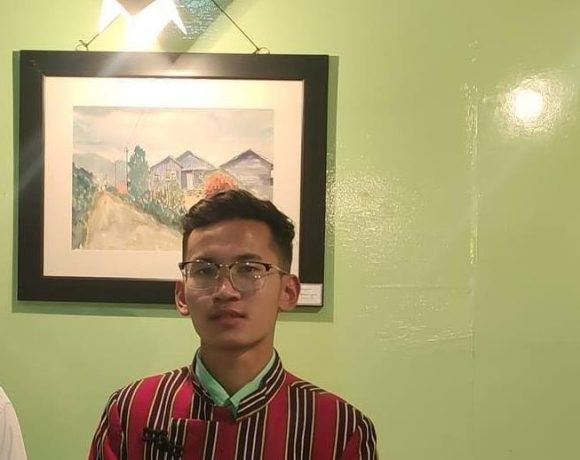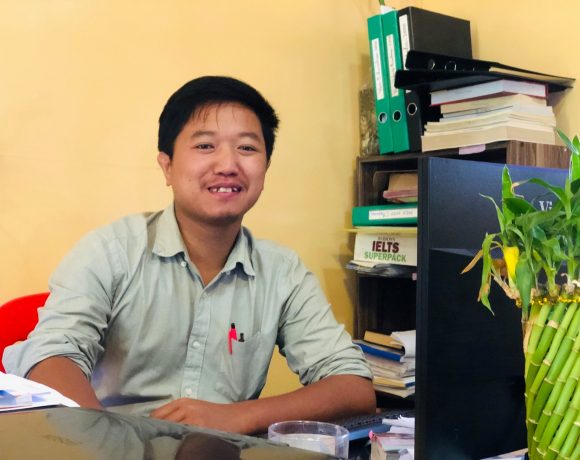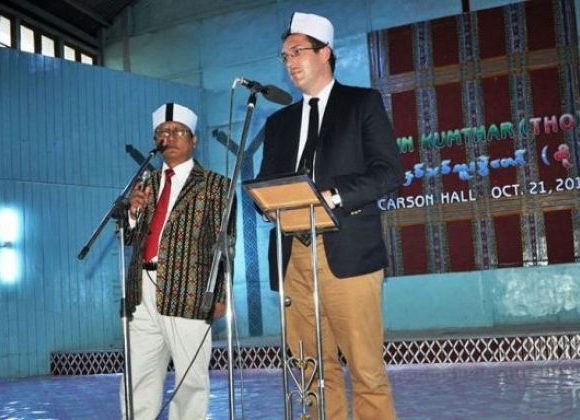“No policies, laws … for disabled people in Burma”: Interview with ECDC Co-founder

24 February 2014: Changes in Burma receive international acclaim but questions are raised in regards to its impact on the lives of citizens on the ground in general, and disabled people in particular.
Hta Uke, Co-founder of the Eden Centre for Disabled Children (ECDC), talks about the current situation of disabled people in the country in the light of reforms, what needs to be changed in order to understand disability, and more …
Chinland Guardian: The ECDC has existed for more than 13 years in Rangoon, Burma. Looking back at the start and the current situation now, what can you share with us in terms of its impact on children with disabilities?
Hta Uke: Thank you for your question. When Eden was established in 2000 there was no service provision centre for physically and intellectually disabled children in the private sector. ‘School for Disabled Children (SDC)’ is the only school in the whole country, which is run by Social Welfare Department (DSW) and provides only education for them.
After 13 years of running ‘Eden Centre for Disabled Children (ECDC)’, the awareness of not only physically and intellectually disabled children but also all types of disabled people is improving. Today there are nearly 35 centers, where necessary services can be accessed by physically and intellectually disabled children around the country. Some of these schools are run even as businesses to make money.
The ECDC is playing a leading role in promoting awareness of disability issues not only for service delivery related but also for disseminating new concepts of disability, and social model of disability. This changes many disabled children’s lives and they are enjoying fundamental human rights such as accessing various kinds of rehabilitation, education, and social care services. Furthermore, they experience joy, acceptance, value, and being part of community, which they never experienced before.
Chinland Guardian: There must be some changes in ECDC, too, in line with various demands and necessities over the past ten years. What are the improvements so far and what else do you plan to do in the near future?
Hta Uke: Yes, there is a huge change in the ECDC, especially in its mandate towards disability. Charity approach was the core driving force when it was established but now, after five years since starting the ECDC for learning disability, our approach has changed from charity to right-based approach. In other words, the ECDC adopts a social model of disability as its core value and mandate.
We keep on learning through our experiences, especially on how to introduce and implement this new understanding of disability not only in our own activities and program but also in disseminating it to other disability-related organizations in Burma. So far, this concept is gradually becoming known and accepted in the community, especially amongst those who work in the field of disability. It is not only because the ECDC is advocating the ‘Social Model of Disability’ but also because of the influence of global trends.
A significant improvement in the disability field in the country during the first decade of 21st century is that Burma’s government already ratified the ‘Convention on the Rights of Persons with Disabilities (CRPD)’ on 7 December 2011. During the first three years of the new government, more international NGOs and local NGOs have been having disability-related programs, and organizations for disabled people in the country have been becoming more active.
In my opinion, the new understanding of disability or the ‘Social Model of Disability’ is exactly the same as the ‘Biblical Model of Disability’. I would like to simplify this subject within our Christian community in coming days. This is our plan and prayer.
Chinland Guardian: How many children are there currently at the ECDC? Are there official statistics for disabled populations in the country?
Hta Uke: Currently in this 2013-14 academic year, more than 130 disabled children are registered as day care students in the ECDC. There are other categories. For instance, we have a special case category where disabled children are not registered as day care students but are provided services as they are from other parts of the country, not from Rangoon. We provide care giver training and make treatment plans for children individually before they go back to their home towns.
It was mentioned in the report ‘Basic Survey on Disability’ by The Leprosy Mission International (TLMI) and Social Welfare Department (DSW) in 2008-09 that 2.32% of the total population in Burma was estimated to be disabled.
Chinland Guardian: How about the policies, laws and regulations in regards to people with disabilities in Burma and do the current reforms make anything changes in this regard?
Hta Uke: So far, we have no policies, laws and regulations in regards to disabled people in Burma. Attempts are being made towards these issues but nothing has come out yet. Despite two years of the ratification of the ‘Convention on the Rights of Persons with Disabilities (CRPD)’, we still have no laws, policies and legislation for disabled people in the country.
Both the Organization for Persons with Disabilities and Organization of Persons with Disabilities are now more united and raising voices – things which have never been brought about before. The majority of the disabled citizens, especially in ethnic areas like Chin and Kachin States, are in the same situation as before.
Chinland Guardian: So, what else do you think needs to be changed or improved in general to make the situation or lives of the disabled better?
Hta Uke: I think the way we see and understand disability is very important because it is true that our definition, concept and understanding design our policies, laws and ways in which activities are implemented. We need to change our traditional understanding of disability. We need to see disability issues from a social model perspective. As long as we see disability from medical or individual strategy perspectives, all the work and effort will lead only to perpetuating the current most segregated, vulnerable, oppressed status. Our definition and concept should be sound and correct. Otherwise, problems related to disability will never be solved.
The needs are huge. We need to start from the beginning. We need to see disability as purely a social issue rather than a personal health problem. Only if and when policies related to disability can break the barriers, will the equal inclusion of disabled people into our society happen soon.
The situation or lives of disabled people will become better when there is no discrimination against them, when they can get the same access to fundamental human rights as non-disabled peer citizens, when they are accepted and valued by others, and when they can live a life as meaningfully as others wherever they live.
Disability mainstreaming policy is vital and a core need for disabled people. For instance, ‘Inclusive Education (IE)’ policy will need to be adopted clearly and strongly in the new education law. A‘Community Based rehabilitation (CBR)’ approach needs to be adopted for poverty reduction. Universal design should be one of the main codes of conduct for every construction around the country, and media and information should be accessible for every citizen including disabled people.
Chinland Guardian: You finished your master’s degree in disability studies at the University of Leeds in the UK. What experiences in the UK can you share with us about disabilities in comparison with the situation in Burma?
Hta Uke: Learning Disability Studies at the University of Leeds, UK really opened my eyes. It helped me to see life from a disabled perspective more clearly. My experience in the UK has transformed me for my whole carrier and my world view. UK and Burma are totally different. Even in the UK, all disabled people do not enjoy their fundamental human rights fully in their individual lives but what I really appreciate as unique is that every disabled person can raise their voice regarding their rights openly, without fear. Their lives and existence are seen very differently by other citizens compared to Burma. The environment, both physical and socio-psychological, is much more friendly and accessible in the UK. Democratic culture can be seen very clearly in the lives of disabled people in the UK. Currently, Burma is just the opposite to it.
Chinland Guardian: Can you update us on the situation of disabilities in Chin State and among Chin people because there is not much reporting or movement regarding the issue so far?
Hta Uke: In Chin State until today, there is still no program for disabled people, either in the government or the private sector. The first self-help group (SHG) of disabled people emerged in Thantlang town in 2008. The first disability survey was done in that year in the three townships of Falam, Hakha and Kanpetlet. According to the survey findings, the disabled population in Chin State is estimated to be about 2.19% of the total population.
The first official celebration of the United Nations International Day of Disabled Persons (IDD) was conducted in Hakha on 3 December 2013. The first day care service provision centre was established in Hakha in late 2012. The only progress so far is that SHG has been transformed into the Chin Disabled People Organization, which is believed to be the only disabled people organization in Chin State.
The ECDC has made an attempt to start disability-related programs or projects in Chin State and we hope that the first community-based rehabilitation or community-based inclusive development project will be implemented in both Hakha and Thantlang townships from February 2014 through the help of one of our partner organizations from Germany. The project duration will be two years.
Chinland Guardian: Your message to those who care for the disabled in Chin State and Burma as a whole.
Hta Uke: Disabled people are part of every human society and we would like to see this happen, improve and continue in our society, too. To see and understand disability issues from a social perspective is vital. It changes everything from our concept, view to our attitude toward them.
Disabled people are not an object of charity, and are not abnormal or second class citizens, but they are like you and myself. And they deserve the same respect, value and acceptance equally as every other human being. As it is said, “Whenever we deny the humanity of other people, we desecrate our own,” so let’s treat them as we treat ourselves.
How you treat a disabled person is an indicator of not only you but also the level of civilization. The quality of disabled people’s lives is an indicator of the community they live in, with regards to social justice, human rights, development, civilization, and so on. We all need to see the whole picture from the perspective of disabled people.#






